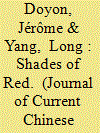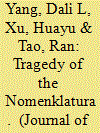| Srl | Item |
| 1 |
ID:
165428


|
|
|
|
|
| Summary/Abstract |
States use repression to enforce obedience, but repression—especially if it is violent, massive, and indiscriminate—often incites opposition. Why does repression have such disparate effects? We address this question by studying the political legacy of Stalin’s coercive agricultural policy and collective punishment campaign in Ukraine, which led to the death by starvation of over three million people in 1932–34. Using rich micro-level data on eight decades of local political behavior, we find that communities exposed to Stalin’s “terror by hunger” behaved more loyally toward Moscow when the regime could credibly threaten retribution in response to opposition. In times when this threat of retribution abated, the famine-ridden communities showed more opposition to Moscow, both short- and long-term. Thus, repression can both deter and inflame opposition, depending on the political opportunity structure in which post-repression behavior unfolds.
|
|
|
|
|
|
|
|
|
|
|
|
|
|
|
|
| 2 |
ID:
097764


|
|
|
|
|
| Publication |
2010.
|
| Summary/Abstract |
Conceptualising Russia as a neopatrimonial state directs attention to the patrimonial relations that pervaded formal institutions to reveal increasing tensions within the state during Putin's presidency. A case study of parliamentary oversight practices points to the emergence of legitimation as their key purpose, but also to the growing contradictions between the controlling and legitimating impulses of Putin's regime. At the same time deputies responded to the changes in their status and influence by moving their resources towards the patrimonial sphere, most notably utilising oversight institutions for direct and indirect private interests-activities tolerated by the regime in exchange for political loyalty.
|
|
|
|
|
|
|
|
|
|
|
|
|
|
|
|
| 3 |
ID:
189220


|
|
|
|
|
| Summary/Abstract |
While changes in Chinese Communist Party (CCP) recruitment are generally described as different phases focused on recruiting either “reds” or “experts,” giving more or less weight to political or technical criteria, we instead stress the importance of changing understandings of political loyalty to examine these evolutions. By tracing these changes throughout the party's 100 years, we show that how the party understands loyalty is largely strategic, detached from a purely ideological approach. The CCP has alternatively approached loyalty in ascriptive terms, based on class background, and behavioural ones, looking at active displays of loyalty or passive obedience. The level and form of activism expected from party members and cadres have also dramatically changed over time. Relying on recruitment data, this article shows that it is paradoxically during periods of party expansion that the CCP becomes more politically demanding with its members.
|
|
|
|
|
|
|
|
|
|
|
|
|
|
|
|
| 4 |
ID:
133813


|
|
|
|
|
| Publication |
2014.
|
| Summary/Abstract |
We review James Kung and Shuo Chen's study, published in the American Political Science Review, on the causes of China's Great Leap Famine (1959-1961). Kung and Chen explain the variations in provincial leaders' radicalism on the basis of the career incentives facing the provincial First Secretaries. In this article, we question the validity of their basic assumptions and also uncover serious issues with the Kung and Chen dataset. We conclude that their empirical findings were based on faulty foundations. Our alternative hypothesis instead explains the dynamics of political radicalism during the Great Leap Forward in terms of the provincial leaders' political loyalty to Mao. Our findings point to the significance of political networks in influencing the behavior of elites and, by extension, political and socio-economic outcomes.
|
|
|
|
|
|
|
|
|
|
|
|
|
|
|
|